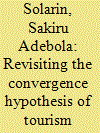| Srl | Item |
| 1 |
ID:
150398


|
|
|
|
|
| Summary/Abstract |
This paper examines the integration properties of the total oil consumption in 57 countries for the period of 1965–2012. A combination of new and powerful linear and nonlinear stationarity tests are employed to achieve the objectives of the study. We find that the oil consumption series in 21 countries follow a nonlinearity path while those in the other countries are linear in nature. Evidence of the presence of a unit root is found for the total oil consumption series in 38 countries while the series is stationary in the remaining 19 countries. An important insight is that the blueprints that were designed to reduce oil consumption are likely to have a permanent effect in most of the countries.
|
|
|
|
|
|
|
|
|
|
|
|
|
|
|
|
| 2 |
ID:
162554


|
|
|
|
|
| Summary/Abstract |
Anecdotal evidence offers conflicting views on the impact of globalisation on military expenditure. We contribute to the existing literature by investigating the effect of globalisation on military expenditure in 82 countries for the period, 1989–2012. After introducing economic and strategic variables into the model, we utilise the dynamic panel generalised method of moments system to estimate the relationship in the variables. The empirical findings reveal that globalisation reduces both military burden and real military expenditure. The findings are consistent, irrespective of the globalisation indicator adopted. The policy implications of the results are explained.
|
|
|
|
|
|
|
|
|
|
|
|
|
|
|
|
| 3 |
ID:
137930


|
|
|
|
|
| Summary/Abstract |
This paper examines the impact of military expenditure on stock market development in 36 countries over the period 1989–2010. Within a panel framework, the system GMM estimates is utilised to test the relationship with an array of control variables. We augment the traditional measure of military expenditure–military burden, with a newly constructed comprehensive index – Global Militarisation Index. Overall, the results show that military spending has a negative and significant effect on stock market performance in the selected countries.
|
|
|
|
|
|
|
|
|
|
|
|
|
|
|
|
| 4 |
ID:
174614


|
|
|
|
|
| Summary/Abstract |
In pursuit of good governance and better allocation of resources, corruption is of interest to policymakers and citizens alike. Using panel data from 1996 to 2016 for 59 countries, the aim of this paper is to examine the relation between military spending and corruption. Taking the advantage of GMM method, we have shown across different measures of military spending, countries with higher levels of corruption tend to exhibit higher levels of military expenditures.
|
|
|
|
|
|
|
|
|
|
|
|
|
|
|
|
| 5 |
ID:
128310


|
|
|
|
|
| Publication |
2014.
|
| Summary/Abstract |
The purpose of this article is to examine the convergence hypothesis in South Africa's tourism markets over the period January 2000-December 2011. To check the existence of convergence, the study follows existing papers by applying a unit root test on the difference series and a cointegration test on the original series of visitor arrivals. Premised on geographical dimension, we further investigate cluster-based convergence within African and overseas source markets in South Africa. The results provide evidence for long-run convergence in tourism markets. Furthermore, the findings of cluster-based convergence provide greater support for the convergence within African and overseas source markets, respectively. These findings imply that previous policies aimed at boosting total visitor arrivals in South Africa have been successful, and maintaining such (or similar) strategies may continue to enhance international visitor arrivals in the country.
|
|
|
|
|
|
|
|
|
|
|
|
|
|
|
|
| 6 |
ID:
124709


|
|
|
|
|
| Publication |
2013.
|
| Summary/Abstract |
This paper investigates the causal relationship between economic growth, urbanisation and electricity consumption in the case of Angola, while utilizing the data over the period of 1971-2009. We have applied 39 and 40 unit root tests to examine the stationarity properties of the series. Using the Gregory-Hansen structural break cointegration procedure as a complement, we employ the ARDL bounds test to investigate long run relationships. The VECM Granger causality test is subsequently used to examine the direction of causality between economic growth, urbanisation, and electricity consumption. Our results indicate the existence of long run relationships. We further observe evidence in favour of bidirectional causality between electricity consumption and economic growth. The feedback hypothesis is also found between urbanisation and economic growth. Urbanisation and electricity consumption Granger cause each other. We conclude that Angola is energy-dependent country. Consequently, the relevant authorities should boost electricity production as one of the means of achieving sustainable economic development in the long run.
|
|
|
|
|
|
|
|
|
|
|
|
|
|
|
|